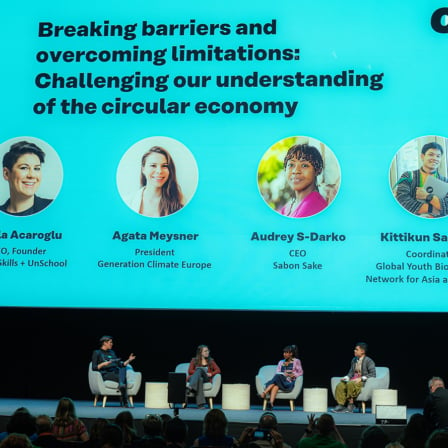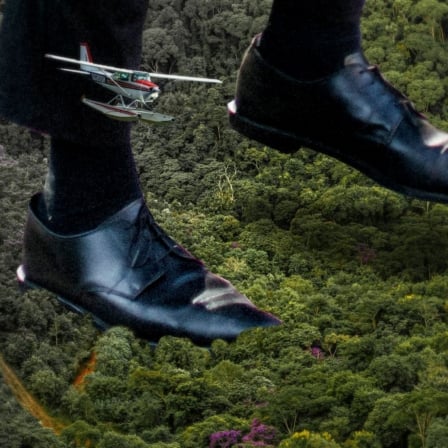Promoting cleantech innovations may not be easy, but it is by no means impossible either. What would it take to place Finland on the world map of cleantech? Sitra’s recent survey provides Finnish decision-makers and companies with information on good practices for promoting and commercialising cleantech innovations.
Finland wants to be a forerunner in the bioeconomy, the circular economy and cleantech by 2025 – a very ambitious goal for a very short time span. Luckily, there are many ways in which the goal can be achieved, such as creating new jobs in growing cleantech companies. Development efforts have to be targeted at home markets as well, since we need cleantech reference areas of an international standard.
Traditionally, Finland has been doing well in comparisons that measure the generation of innovations. For example, in the international Global Cleantech Innovation index of 2014 Finland came second. However, the challenge for the Finnish cleantech sector – as well as that of almost any other industrialised country – lies in the commercialisation of innovations.
The survey Sitra commissioned from the Finnish Environment Institute (SYKE) – Cleantech kasvuun! Keinoja ja hyviä käytäntöjä (Growth for Cleantech! Methods and Good Practices; available only in Finnish) – shows that the key areas of weakness in innovative Finnish business operations are transforming innovations into business, leveraging stakeholder co-operation, and long-term financing.
“You have an excellent track record of creating innovations when measured in such terms as registered patents, venture capital investment and numerous start-up enterprises of high international standard,” pointed out Stefan Henningsson, one of the developers of the Global Cleantech Innovation Index, at the panel discussion held in connection with the publication of the survey on 30 September. “Too bad that in renewable energy investment attractiveness, the largest cleantech investment sector, you rank among the poorest performers”.
Lack of marketing skills is not the only shortcoming, though. To ensure easier access to markets for innovations, alongside the development of technologies, increasing attention should be paid to mapping and understanding the clients’ needs. The Finnish business culture has much to learn from the bold, risk-taking business cultures of, for example, Israel and the Silicon Valley, both of which tolerate failure.
Competence and perseverance drive competitiveness
Know-how and its constant development are the cornerstones of cleantech innovation activity. From decision-makers, this requires a new approach to education policy and perseverance in the development of basic research. In companies, on the other hand, know-how can be developed by such means as hiring international staff and working in close collaboration with research institutes and universities.
To ensure our international success, we need to be able to transform our top-level cleantech know-how into successful export products. According to Raimo Lovio, professor in environmental and innovation management at Aalto University, the Finnish innovation system should be reformed to meet the needs of the cleantech revolution of the 2010s and 20s.
More than just in education, perseverance is also needed in companies, because cleantech technology’s path from an idea to a commercial product is often long. In major international companies, the development of a new cleantech technology patent into a mass product takes an average of 24 years. When a company takes better account of the client’s needs in the product development phase, this also boosts the company’s faith in its own product or service.
The Finnish family-owned company Are, with a history spanning more than a century, has turned perseverance into a competitive advantage. Are’s products reduce energy consumption by means of smart housing-technology solutions, and the family-owned company structure enables development of new products over long periods of time. Vesa Hakkarainen, Business Area Director at Are, considers it important to take advantage of public procurement in the introduction of energy efficiency solutions. He is looking forward to getting an opportunity to build novel service models, such as leasing solutions for housing technology.
Crossing the death valley of clean innovations
Cleantech companies shifting from R&D to commercialisation often find it hard to attract funding, although many other sectors face the same challenge as well. The commercialisation phase is aptly referred to as the death valley of innovations, since innovations serve no purpose whatsoever if they cannot be launched into the market.
The challenges posed by this death valley can be addressed by public-private collaboration and novel funding models. For example, the German company Enerkite succeeded in collecting almost one quarter, i.e. 350,000 euros, of its total required funding package of 1.5 million euros through crowdfunding. The company, developing small airborne wind energy converters, has made great efforts to enhance the marketing skills of its engineers. This has brought visible results.
“We enjoy saving the world. But innovation takes time and needs space,” says Alexander Bormann, CEO of Enerkite. “That is why regulation should be relaxed, when seeking new energy solutions that will change the world. The airplane would never have been invented if everything had been regulated at that time.”
Politics enables cleantech growth
According to the survey, cleantech innovation activities need clearer political support than is currently available in Finland. This would help develop the markets and, consequently, increase investment. At least the lack of methods for promoting cleantech cannot be blamed for this inactivity, since decision-makers have a wide range of means available for this. Even though some of the decisions are made at the international or EU level, there is still plenty of room for national and municipal decision-making as well. Decision-makers can, for example, support the growth of the home market for cleantech, make market entry of clean products easier and raise the cost of polluting production.
“Even more important than granting financing for trials is to establish clear, long-term steering methods that will direct demand towards clean solutions,” says MP Kai Mykkänen, who participated in the panel discussion.
Checklist for those promoting cleantech
At best, the use of clean technologies can reduce emissions, enhance the state of the environment and generate positive economic impacts. Sitra’s survey highlights the following important practices for companies and decision-makers in promoting cleantech:
For companies
- Design your cleantech products to meet the client’s needs.
- Trust that there is demand for innovative cleantech service concepts.
- Use novel business models and versatile international know-how.
- Make room for new ideas with the help of a bolder and more open corporate culture.
- Develop your own networks and participate in international co-operation within the sector.
For decision-makers
- Cleantech needs perseverance in public steering.
- Strengthening good regulation and dismantling unnecessary regulation promote cleantech.
- Maintenance and long-term development of know-how constitutes an important part of competitiveness in the technology market.
- The public sector can boost the funding of cleantech companies in collaboration with private financing institutes.
- The ambitious urban and regional environmental goals nourish cleantech innovations.
According to Stefan Henningsson from WWF, Finland is very well equipped to enhance its positions in the international cleantech market by paying attention to the home market and building strategic partnerships. Finland could become, say, a Nordic cleantech hub for the growing markets in Asia and North America. Such a world-class Smart & Clean reference area is already under construction in the capital region.
Sitra’s Carbon-neutral industry focus area builds practical tools in collaboration with companies for making the transition towards a carbon-neutral society. We provide Finnish companies with information, methods and models that help them draw up a roadmap towards carbon neutrality and to improve their competitive edge. Developing new carbon-neutral business and commercialising cleantech innovations is an essential part of this transition.






















Recommended